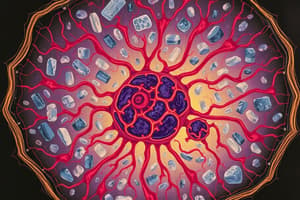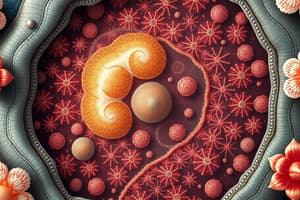Podcast
Questions and Answers
What is one main difference between cells and tissues?
What is one main difference between cells and tissues?
- Tissues can exist independently, while cells cannot.
- Cells can be seen with the naked eye, while tissues cannot.
- Cells replicate through photosynthesis, while tissues use cellular respiration.
- Cells are the smallest units of life, while tissues are groups of similar cells. (correct)
Which of the following statements about tissue types is correct?
Which of the following statements about tissue types is correct?
- Connective tissue primarily consists of tightly packed cells.
- Epithelial tissue is known for its ability to conduct electricity.
- Muscle tissue is specialized for contraction and movement. (correct)
- Nervous tissue is not involved in sensory perception.
Which of the following best describes connective tissues?
Which of the following best describes connective tissues?
- Connective tissues connect different parts of the body and provide support. (correct)
- Connective tissues primarily transport nutrients and gases.
- Connective tissues are responsible for covering body surfaces.
- Connective tissues are exclusively related to muscle contraction.
What characteristic is essential for the function of muscle tissues?
What characteristic is essential for the function of muscle tissues?
Why is epithelial tissue important in the body?
Why is epithelial tissue important in the body?
Flashcards are hidden until you start studying
Study Notes
Cells
- Fundamental units of life, responsible for carrying out essential biological functions.
- Three main types: prokaryotic (bacteria), eukaryotic (plants and animals), and archaea.
- Eukaryotic cells have membrane-bound organelles, including the nucleus, mitochondria, and endoplasmic reticulum.
Tissues
- Groups of similar cells working together to perform a specific function.
- Four primary tissue types: epithelial, connective, muscle, and nervous.
- Epithelial tissue covers body surfaces and lines cavities; specialized for absorption, secretion, and sensation.
Epithelial Tissue
- Comprised of closely packed cells with minimal extracellular matrix.
- Classified based on cell shape (squamous, cuboidal, columnar) and layering (simple, stratified, pseudostratified).
- Functions include protection, permeability, sensation, and secretion.
Connective Tissue
- Supports, binds, and protects other tissues and organs.
- Consists of cells, fibers (collagen, elastin), and ground substance.
- Types include loose, dense, adipose, cartilage, bone, and blood, each serving distinct roles in the body.
Muscle Tissue
- Specialized for contraction and movement, composed of muscle fibers.
- Three types: skeletal (voluntary, striated), cardiac (involuntary, striated), and smooth (involuntary, non-striated).
- Facilitates locomotion, digestion, and circulation.
Nervous Tissue
- Forms the brain, spinal cord, and nerves; responsible for communication and signal processing.
- Comprised of neurons (transmit signals) and glial cells (support and protect neurons).
- Essential for integrating and coordinating bodily functions and responses.
Cell Structure
- Key components: cell membrane, cytoplasm, organelles, and nucleus.
- Cell membrane regulates entry and exit of substances, maintaining homeostasis.
- Organelles such as ribosomes, Golgi apparatus, and lysosomes play specific roles in cellular activities.
Microscopy in Study
- Different microscopy techniques, such as light and electron microscopy, provide insights into cell and tissue structures and functions.
- Enables visualization of cellular components and tissue organization at various magnifications.
Importance of Cell and Tissue Study
- Essential for understanding growth, development, and disease mechanisms.
- Underpins advancements in medical research, regenerative medicine, and biotechnology.
Studying That Suits You
Use AI to generate personalized quizzes and flashcards to suit your learning preferences.





